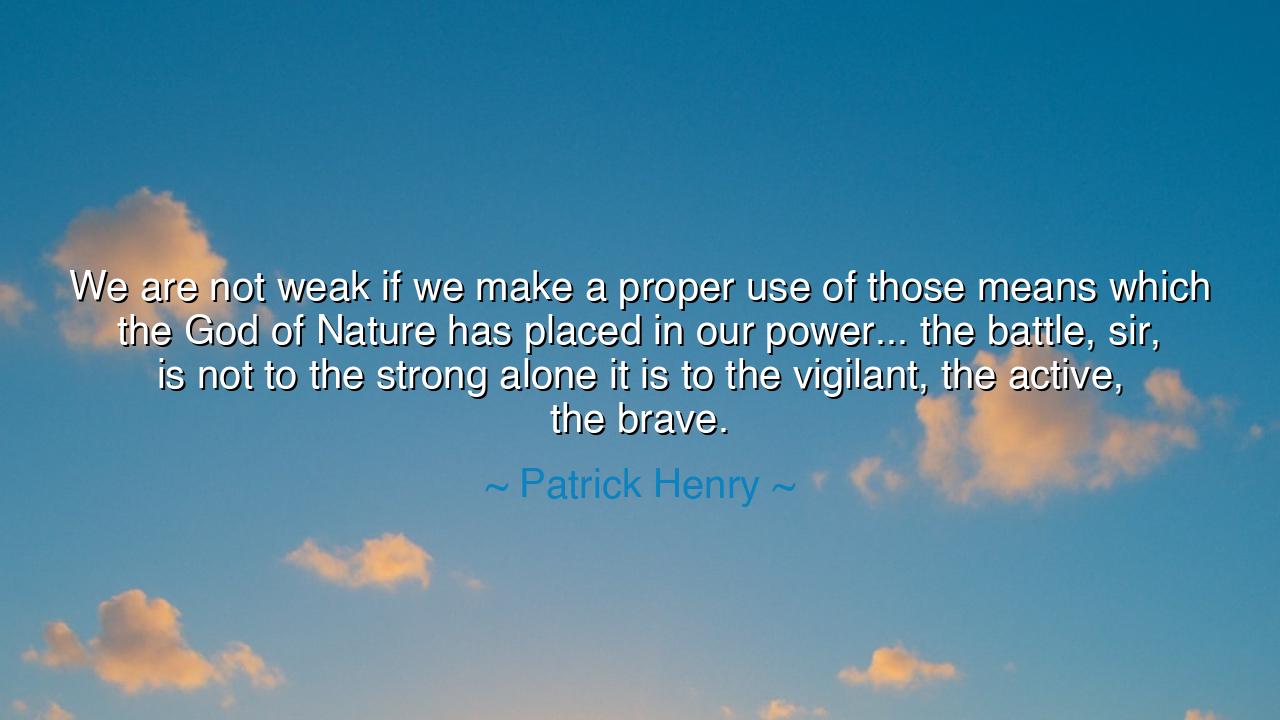
We are not weak if we make a proper use of those means which the
We are not weak if we make a proper use of those means which the God of Nature has placed in our power... the battle, sir, is not to the strong alone it is to the vigilant, the active, the brave.






"We are not weak if we make a proper use of those means which the God of Nature has placed in our power... the battle, sir, is not to the strong alone; it is to the vigilant, the active, the brave." These stirring words of Patrick Henry ring with the wisdom of the ages, calling upon us to recognize the power that lies not in brute strength alone, but in the qualities of the vigilant, the active, and the brave. In this powerful declaration, Henry speaks not only to the warriors of his time but to all who would face the challenges of life. He reminds us that true strength is not merely the ability to overpower, but the ability to seize opportunity, to be watchful and prepared, to act decisively and courageously when the moment demands it.
Consider the ancient warriors—the Greeks and Romans—whose might was not just in their swords and shields, but in their strategy, their foresight, and their ability to adapt. In the Battle of Marathon, the mighty Persian Empire, though vastly superior in numbers, faced defeat at the hands of the Athenians. It was not the size of their army that won the battle, but the vigilance of the Athenians. They were alert, prepared, and swift in their decision-making. They knew the value of their position, of timing, and of strategy. This battle reminds us that victory belongs not to the strongest but to those who understand how to wield their resources and act with purpose.
Similarly, we can look to the life of David and Goliath—a story etched in history as a testament to the triumph of the vigilant and brave over the seemingly invincible. David, a mere shepherd boy, armed with nothing but a sling and his courage, faced the mighty Goliath, a giant warrior clothed in armor. Though Goliath was powerful, David was active—he did not wait for a miraculous event but chose to act with bravery, using the very tools at his disposal. He was not paralyzed by fear, but instead took his destiny into his own hands. His victory teaches us that strength is not always found in size or force, but in the courage to act with what we have, no matter how small or seemingly insignificant.
This principle holds true in the everyday battles of life. Often, we are told that only the strong, the rich, or the powerful succeed. But Henry’s words remind us that success is not determined by raw power alone. Consider the struggles of the American Revolution, where a ragtag group of farmers, merchants, and common men faced the mightiest empire in the world. They were outgunned, outmanned, and outmatched, yet they triumphed because they were vigilant in their cause, active in their efforts, and brave in their resolve. Their victory was not due to superior force, but to their unyielding courage and their willingness to seize the moment—to fight for what they believed was right.
The lesson of Henry’s words is clear: strength is not just physical; it is a quality of the mind and the spirit. The vigilant are those who remain aware of their surroundings, who do not fall prey to complacency. The active are those who, regardless of their circumstances, take action—who do not wait for things to happen but make them happen. And the brave are those who act in the face of fear, who rise above the limitations that others may impose upon them. It is these qualities—vigilance, action, and bravery—that give us true power and enable us to overcome even the greatest of challenges.
In our own lives, we must learn to harness these qualities. When faced with adversity, we should not look to our strength alone, but to our awareness, our ability to act decisively, and our courage to rise to the occasion. Opportunities come not to the strongest, but to those who are prepared to seize them. Life is a series of battles, some large, some small, but each requiring the same qualities that Henry so eloquently describes.
So, let us be vigilant in our pursuits, active in our endeavors, and brave in the face of fear. Let us not be swayed by the apparent strength of our enemies, nor by the obstacles that seem to stand in our way. For the battle is not to the strong alone, but to those who make use of the tools, the courage, and the wisdom granted to them. By doing so, we shall find that we are not weak, but stronger than we ever imagined. The strength to prevail lies within us, in our actions, in our awareness, and in the unyielding bravery with which we face each challenge that life presents.






AAdministratorAdministrator
Welcome, honored guests. Please leave a comment, we will respond soon